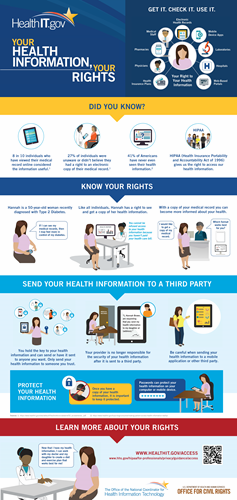Your Health Information Rights
You have greater control over your own health information than ever before, thanks to advances in digital technology, recent federal legislation, and healthcare’s focus on patient-centered care.

- You can set some limits on who sees personal information about your health and set limits on what information they can see.
- You can also review and ask for corrections to your medical records.
Each one of us has a right to accurate, secure, and confidential personal health information. As you advocate on behalf of yourself or a loved one, it’s important to know your rights when requesting health data.
Use this information to help you make safe and informed decisions about your health information.
The right to look at your health information and/or get a paper or electronic copy of it.
- You have the right to read and review your health information. Access can be requested at any time. You have the right to get a paper or electronic copy of your health information in a timely manner according to federal law.
The right to accurate and complete health information.
- You have the right to expect that your health information is accurate and complete. The quality of the healthcare you receive depends upon accurate and complete health information. Incorrect or incomplete health information can prevent you from understanding your overall health and can keep you from receiving the care you need.
The right to ask for changes to your health information.
- You have the right to ask for changes to your health information when you think it is incorrect or incomplete. It is up to your doctor, hospital, or other healthcare providers whether or not the requested change will be made to the health record. The provider must notify you in a timely manner of the decision in writing. Your written or electronic request for changes will be kept with your health record.
The right to know how your health information is used or shared and who has received it.
- You have the right to a written explanation of how your health information is used. Your healthcare provider must give you a Notice of Privacy Practices that describes the possible uses and releases of your health information. You have a right to ask your provider for a list (an accounting) of those who have received your information. That list will not include information you agreed to be shared or used by those involved in the treatment, payment, or healthcare operations for your care.
The right to ask for limitations on the use and release of your health information.
- With the exception of emergency treatment, you have a right to ask for a limit on the health information your provider shares with others involved in your care or for the payment of your care. Your provider may deny the request but must provide you with a reason why. You may also ask, and a provider is required, to restrict certain information from your healthcare insurance company, provided you pay for that care out of your own pocket, and the information is not otherwise required by law.
The right to expect your health information is private and secure.
- You have the right to expect that your health information will be protected and kept secure from people who should not have it. You have the right to expect that your health information is kept secure when it is shared with authorized healthcare professionals. You also have the right to ask that your provider contact you in the way you prefer, such as by e-mail or phone.
The right to be informed about privacy and security breaches to your health information.
- You have the right to expect that organizations will hold staff responsible for any illegal access, use, or release of your health information. As required by law, you have the right to expect that any illegal use of your health information will be investigated and that you will be notified and given instructions on what to do next.
The right to file a complaint or report a violation regarding your health information.
- You have the right to file a complaint if you think your health information is not being handled correctly. You have a right to expect a timely response. An organization’s Notice of Privacy Practices must tell you how to file a complaint with the organization and with the United States Department of Health and Human Services.
The right to translation.
- Doctors who treat patients covered by Medicare or Medicaid are required to provide translation services to patients whose first language is not English. Also, certain medical documents must be translated for patients, such as treatment instructions, questionnaires and consent forms.
- AHIMA Consumer Health Information Bill of Rights (AHIMA.org)
- Your Rights Under HIPAA (HHS.gov)
- The HIPAA Privacy Rule: Patients' Rights (PrivacyRights.org)

Because older people and those with long-term disabilities use a great deal of healthcare, it is especially important to explain how people with Medicare can protect their interests.
Seek assistance from the State Health Insurance Information Program (SHIP) Agency in your State or locality if you have problems with your Medicare benefits, including Medicare Advantage plans.
Contact information for SHIP programs is available at shiptacenter.org.



